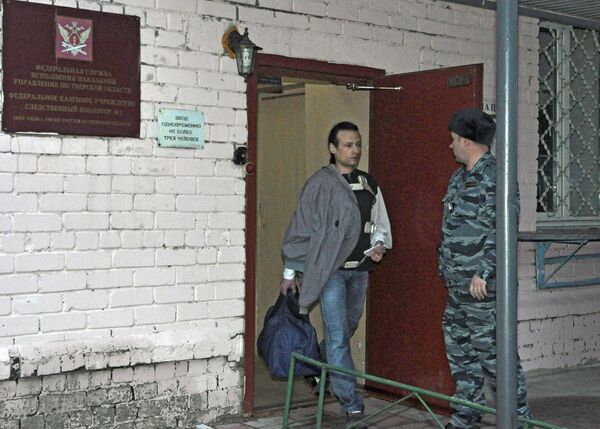MOSCOW, January 10 (RIA Novosti) – A Moscow artist was released on parole Friday after spending more than two years in jail for a bribery conviction that followed his move to a Russian village in a bid to bring culture to the provinces.
Ilya Farber, whose case has become a cause celebre for many opposition activists, said on leaving his detention facility that he intends to work on human rights issues now that he is free.
In a development widely seen as an attempt to burnish the country’s image ahead of the 2014 Winter Olympics in Sochi next month, Russia has freed a number of high-profile prisoners in recent weeks including members of the feminist punk band Pussy Riot and former oil tycoon Mikhail Khodorkovsky.
Farber, 36, who was known for wearing a flamboyant, flowing white shirt and his hair in a ponytail during his trial, left Moscow for the village of Moshenki in central Russia in 2010 to teach art, music and literature.
He has been compared by the media to participants in the 19th-century “to the people” movement, in which Russian intellectuals left their city homes for the provinces in an attempt to bring education and culture to the peasantry and bridge the chasm between urban and rural life in Russia that persists to this day.
Farber was accused of taking a bribe in 2011 from a company he contracted to renovate Moshenki’s town hall.
He has always denied the charges, maintaining he was framed by a dishonest contractor, who was never charged over the incident.
Eventually convicted by a local court on the bribery charges, Farber was sentenced to eight years in a maximum security prison in August 2012 and fined 3.2 million rubles ($96,000).
The total loss to Mosheniki's budget was 940,000 rubles ($28,500), according to the court ruling.
The verdict was widely criticized in the media and by Farber’s supporters, including anti-Kremlin activists, as excessively harsh.
Farber's prison term was reduced to seven years and one month shortly after his original trial. Last month a regional court halved his sentence, making him eligible for parole that was granted on December 31.


